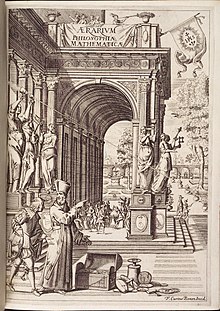Mario Bettinus
Appearance

Mario Bettinus (Italian name: Mario Bettini; 6 February 1582 – 7 November 1657) was an Italian Jesuit philosopher, mathematician and astronomer. The lunar crater Bettinus was named after him by Giovanni Riccioli in 1651.[1] His Apiaria Universae Philosophiae Mathematicae is an encyclopedic collection of mathematical curiosities.[2] This work had been reviewed by Christoph Grienberger.[3] Bettini was one of the fiercest Jesuit critics of Cavalieri's method of Indivisibles.[4]
Works

- Apiaria Universae Philosophiae Mathematicae, 1642
- Aerarium philosophiae mathematicae (in Latin). Vol. 1. Bologna: Giovanni Battista Ferroni. 1647.
- Aerarium philosophiae mathematicae (in Latin). Vol. 2. Bologna: Giovanni Battista Ferroni. 1648.
- Aerarium philosophiae mathematicae (in Latin). Vol. 3. Bologna: Giovanni Battista Ferroni. 1648.
- Aerarium philosophiae mathematicae (in Latin). Vol. 2. Bologna: Giovanni Battista Ferroni. 1648.
See also
References
- ^ Scott, John M., S.J. (Fall 1995), "34 Jesuits on the Moon" (PDF), Creighton University Window: 12–15
{{citation}}: CS1 maint: multiple names: authors list (link). - ^ Andersen, Kirsti (2008), The Geometry of an Art: The History of the Mathematical Theory of Perspective from Alberti to Monge, Sources and Studies in the History of Mathematics and Physical Sciences, Springer, p. 374, ISBN 9780387489469.
- ^ Gorman, Michael John (2003), "Mathematics and modesty in the Society of Jesus: The Problems of Christoph Grienberger (1564–1636)", in Feingold, Mordechai (ed.), The New Science and Jesuit Science: Seventeenth Century Perspectives, Archimedes, vol. 6, Dordrecht: Kluwer, pp. 1–120, archived from the original on March 13, 2005.
- ^ Amir Alexander (2014). Infinitesimal: How a Dangerous Mathematical Theory Shaped the Modern World. Scientific American / Farrar, Straus and Giroux. ISBN 978-0374176815.
External links
- Bettini's (1642, 2 vol.) Apiaria universae philosophiae mathematicae - Linda Hall Library
Categories:
- 1582 births
- 1657 deaths
- Italian astronomers
- 16th-century Italian mathematicians
- 17th-century Italian mathematicians
- Italian philosophers
- Catholic clergy scientists
- 17th-century Italian Jesuits
- Jesuit scientists
- Italian astronomer stubs
- European philosopher stubs
- Italian academic biography stubs
- Italian mathematician stubs
